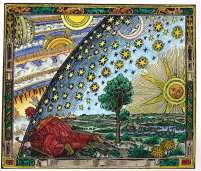Ever since humans looked toward the sky for some kind of meaning to life and answers to the big questions, astrology
has been a part of many people’s lives. The fact that essentially every culture has, at different times, looked towards
the stars for understanding speaks to the universal nature of astrology.
As it evolved from one end of the globe to
the other, it took on a different significance and gravity. Some cultures used it to determine laws and punishments, others
for love and spirituality. The growth of astrology is marked with peace, war, abundance and famine. Human history can be charted
with the history of astrology. Here are a few interesting facts about the history of astrology.
ˇThe origin of astrology
is thought to begin with the ancient Babylonians two centuries before the birth of Christ. They took celestial events that
were witnessed in the night sky and interpreted them to signify certain events. Major events like a passing comet, a meteor
shower or an eclipse were given extreme importance and they often believed that significant actions were needed to calm the
anger of the gods. Human sacrifice wasn’t unheard of in some situations to deal with what the Babylonians thought were
upset deities.
ˇThe first areas of the world that astrology spread to were China, India and Greece. Each culture infused
the basic Babylonian astrological belief structure with their own myths, legends and interpretations. In Greece, many of the
characters from ancient Greek mythology were combined with the stars to give their astrology it’s own local style. The
same was true for India and China where local religion and superstition was combined with astrology to give it more meaning
to the local population.
ˇAstrologers were some of the first scientists in medieval Europe. It was astrologers that
made the first accurate maps of star movement as well as the orbit of the moon and many astronomical observations about the
Earth, itself. Many scientists today look down upon astrology as being a pseudo-science, but without the tiereless work and
immaculate record keeping of astrologers hundreds of years ago, the more respected science of astronomy would have been set
back by centuries.
ˇNot only were some of the first scientists astrologers, some of the most respected scientific minds
in human history were practicing astrologers. Historic names such as Kepler, Jung, Galileo, Copernicus and Brahe were all
significant contributors to astrology during their time as scientists. Even with the marginalization of astrology that was
ongoing even in the time that these famous figures were alive, they managed to practice and further the belief in astrology,
along with their better known scientific practices.
ˇAstrology has had a significant impact on modern language. Many different words that are commonly used today
have a root in astrological thinking of the past. For instance, influenza comes from the Latin for influence and was so named
due to the belief that many sicknesses are caused by the influence of planets and heavenly bodies in the sky. The word disaster
originates from the Latin for bad star. And maybe the best known word origin from astrology is lunatic, from the root luna,
meaning moon.
ˇAstrology has had an impact on modern literature, as well. Many writers, including all time greats like
Shakespeare and Chaucer used astrological and planetary explanations for their characters behavior. Such references have become
a part of modern society. The idea that a full moon still influences people’s behavior is just as common today as it
was 500 years ago.
ˇEducation and astrology have had an intertwined past. In Europe, during the medieval period, a
university quality education was divided up into seven separate categories, one for each known planet. These disciplines became
known as the liberal arts; a term still used today on many college campuses. These arts evolved into the modern sciences,
but their roots are firmly planted in the field of astrology.
Astrology has existed in one form or another in almost
every culture on earth since the beginning of time. When humans had nothing else, they had the night sky, crystalline, pulsing
and always changing. It was inevitable that cultures would begin to assign patters and meaning to the night sky since so much
of life depended on rain, sun and the crops that they helped to grow.
Just like any other belief system, there have
been dark times when blood flowed and anarchy reigned due to an interpretation from above, but the true heart of astrology
is still based on the desire for human understanding that is influenced by heavenly bodies. While many modern scientists belittle
astrology and its beliefs, there will always be a group that understands the significance of the planets and stars.
About
the Author: Relationship Advice
http://www.retrievealover.com/articles/3tipstoknow.htm Tons of relationship and love advice for almost all kinds of relationship problems. Save Relationship with our Potent 4-Step
Strategy which work! This incredible package will help you save your relationship or marriage! Also read rave reviews from
thousands of satisfied readers all over the world! Take our FREE Relationship Astro Compatibility Test For You!
http://www.tarotreadingsecrets.com/astro/index.phpArticle Source:
NewAgeArticles.com

